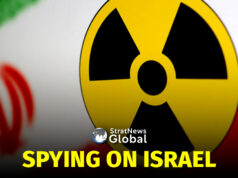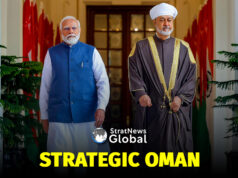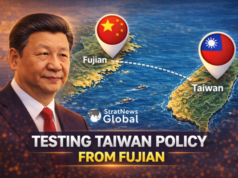NEW DELHI: “India doesn’t have to get its knickers in a twist,” over Russian Foreign Minister Sergey Lavrov’s remarks to the Russian International Affairs Council (RIAC) think tank, says Nandan Unnikrishnan, Distinguished Fellow, Observer Research Foundation. “Judge them by the statement they’ve made through actions post Galwan. They’re supplying everything we’ve asked them for” he points out, referring to requests for fighter aircraft and other military equipment, adding “if India requires something to protect its national interest, the Russians have not given us any indication that they are stepping back from meeting those necessities.”
On December 8, Lavrov told the RIAC, “India is currently an object of the Western countries’ persistent, aggressive and devious policy as they are trying to engage it in anti-China games by promoting Indo-Pacific strategies, the so-called Quad, while at the same time the West is attempting to undermine our close partnership and privileged relations with India. This is the goal of the US’ very tough pressure on New Delhi in the military-technological area.”
On Indian sensitivities to those words, Russia expert Nandan Unnikrishnan tells StratNews Global Associate Editor Amitabh P. Revi, “It cuts both ways. Are we as sensitive to Russia’s national interest as we want them to be towards us?”, adding, Moscow and Delhi “share a fundamental understanding of not wanting any hegemon, whether it’s China or the U.S.” On President Vladimir Putin’s October interview on “not ruling out the possibility of an alliance with China right now”, he points out, the Russian leader also said, ” he doesn’t see any necessity for it right now.” The ORF Distinguished Fellow also discusses the U.S. categorising both Russia and China as adversaries in official strategy, American pressure on India to dilute the relationship with Moscow, the Biden administration and the threat of sanctions for acquiring the S-400 air missile defence system, Russia’s Sudan port deal and the Russian Navy in the Indian Ocean and Indo-Pacific.
The 'Eye' of the story not the 'I' of the story. That's Amitabh Pashupati Revi's credo from the beginning of his professional journey in 1995. From conflicts in the war zones of Afghanistan, Syria, and Iraq to nuances of international politics in the Maldives,Thailand, and South Sudan, Amitabh has reported from all the world's continents, except for Antarctica(so far). Though, he has documented the world's third pole, the Siachen Glacier!
Amitabh reports and produces documentaries on the two-front China-Pakistan threat to India. His ground reports from Arunachal Pradesh and Ladakh have received viewership in the hundreds of thousands. Amitabh has interviewed world leaders, top global analysts, and experts in India, Russia, the United States, and Australia as well. Along the way, he’s picked up the Russian language, the Ramnath Goenka Award for his reporting on the 'Islamic State' terrorist group in Iraq, the Khaled Alkhateb Award for his reporting from Palmyra, Syria, and the UN Dag Hammarskjöld Distinguished Journalist Fellowship. Last but not least, as a founder member of StratNews Global, Amitabh helps lead the reporting, editorial, production, and administration teams at StratNews Global, BharatShakti, and InterStellar on their journey ahead.




